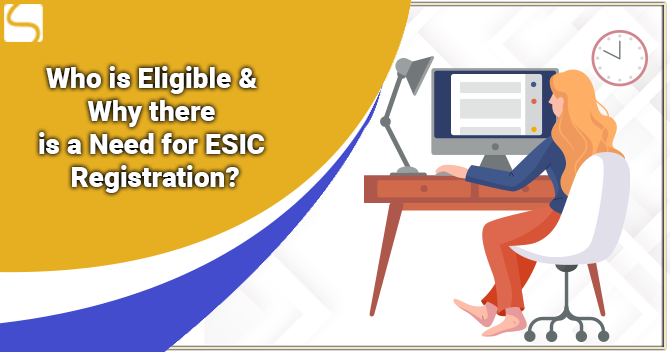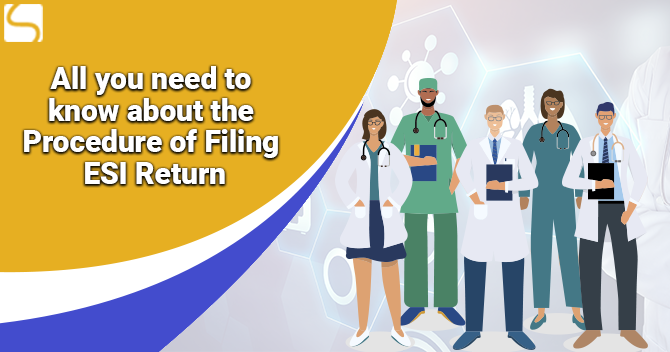Who is Eligible & Why there is a Need for ESIC Registration?

Japsanjam Kaur Wadhera | Updated: Feb 01, 2021 | Category: ESIC
ESI stands for Employee State Insurance which is governed by the Employee State Insurance Act 1948 and managed by the Employee State Insurance Corporation which is an autonomous body created by the law under the Ministry of Labour and Employment, Government of India. The ESI is implemented to look after the Indian workers and provide them with the medical, monetary and other benefits from the employer. ESI registration is important once a company or any other entity employs 10 or more than 10 employees earning less than 21,000 per month. This article will discuss about who is eligible & why there is a need for ESIC registration in India.
Table of Contents
What is ESI Scheme? / Need for ESI Registration
The main purpose for forming ESI Scheme by the government is to provide the workers the health- related benefits and cover the health- related contingencies such as temporary or permanent disablement, death, employment injury, sickness, occupational disease, maternity etc which impacts the earning capacity or results into the loss of income of the worker. This scheme helps the workers to overcome the financial burden due to such unfortunate events and also provides monetary and other benefits to the employees.
The scheme provides for medical care protection to the workers and their dependents and also provides cash benefits during disablement or loss of wages. It also offers pension known as dependent benefit to the members of the family of the insured person in case of injury due to occupational hazard while at work or death of the person.
Any entity having 10 or more than 10 employees providing monthly wages less than 21,000/- salary is required to register itself with ESIC. The employee’s contribution rate is 0.75% of the wages and the employer’s is 3.25% of the wages payable in respect of the employees in every wage period. The employees in receipt of daily average wage of Rs. 137/- are exempted from payment of contribution.
What are the benefits of ESIC Registration?
Some of the benefits of ESIC registration are as follows:
- Medical benefits to the employee and his family members.
- Maternity leaves which are paid to the pregnant women. The beneficiary can avail 100% of the daily wages up to 26 weeks which can be extended to further 1 month based on medical advice. And in case of adoption benefit it is 12 weeks and while in case of miscarriage benefit is 6 weeks.
- Sickness benefits, given at the rate of 70%. it is given when the medical certified sickness is certified and last for 91 days in a year.
- In case of disability caused while working. The nominees are given 90% of the salary until recovery and in case of permanent disability, 90% of monthly wage for the entire life can be availed.
- Death of the employee while working, nominees are given 90% of his salary.
- Funeral expenses.
- Old age expenses provided to the workers.
- In case of unemployment, scheme offers a maximum of 50% of the average monthly wage for a period of 24 months in case of involuntary loss of non- employment or due to permanent invalidity due to injury.
Who is eligible to avail ESI scheme?
- According to Section 2 (12) of the ESI Act, 1948, any person working in non0 seasonal factory with more than 10 employees.
- All the employees working in sectors such as restaurants and hotels, Road- motor undertakings, newspaper establishments, preview theatres and cinemas, medical institutions and educational institutions with a strength of more than 20 employees.
- The existing wage limit of the employee is less than Rs. 21,000 per month and if the employee having disability the wage limit for coverage is Rs. 25,000 per month.
- In order to receive the social security benefits of the ESI scheme the wages up to Rs 10,000 per month should be drawn by the employees.
Entities covered under ESI Registration
Many entities are eligible for registration under the Employees State Insurance Act 1948, as long as it has the required number of employees in that state. The entities covered are as follows:
- Cinemas
- Shops
- Hotels and Restaurants only engaged in sales
- Private Educational Institutions
- Newspaper Establishments
- Roadside motor transport establishments
What are the documents required for ESI Registration?
The documents required for the ESI registration are as follows:
- The certificate of registration of ESIC obtained either under Shop and establishment Act or Factory’s Act.
- Registration Certificate in case of company and partnership deed in case of partnership firm or LLP.
- Memorandum of Association and Articles of Association of the company.
- PAN Card of all the employees and Business PAN Card.
- Details of compensation of all employees.
- List of employees who are working in the establishment.
- List of directors of the company.
- List of Shareholders of the company.
- Cancelled cheque of the bank account of the company.
- Attendance registers of the employees of the company.
ESI Registration Procedure
When the documents are collected, the below mentioned procedure is required to be followed for ESI Registration:
- The applicant is required to download and fill Form No. 1.
- Further on filling the form, the applicant is required to submit it along with all the necessary documents mentioned above.
- Once the verification of the form is done by the ESIC officer, the applicant shall receive a unique 17-digit number by the government.
- The employees, whose registration of this scheme is completed will give to the employer the filled form and the photographs of his family in order to complete the process. This is the part of the process from which the ESI card is provided to the applicant.
- The changes for the employee and the company gets intimated to the ESI.
Annual Return to be filed when ESI registration is completed
Once the ESI registration is completed, the ESI returns are required to be filed twice every year. The below mentioned documents are required to file the returns:
- Register of Form- 6.
- Attendance registers of the employees.
- Returns and Challans on monthly basis.
- Wages registration.
- Register of the accidents happened in the premises of the organization.
Conclusion
The ESI registration is mandatory to provide efficient health care benefits to the employees whose monthly salary is less than Rs. 21,000 and provide them with other essential benefits which are governed by the ESI Act 1948. The ESIC manages the funds as per the rules and regulations laid down by the Act. The question regarding who is eligible and why there is a need for ESIC registration has been discussed above in the article. The purpose of ESI Act is to respect the human dignity during the crises by protecting them from deprivation and social degradation.
Also, Read: Apply for EPF Registration in India?













